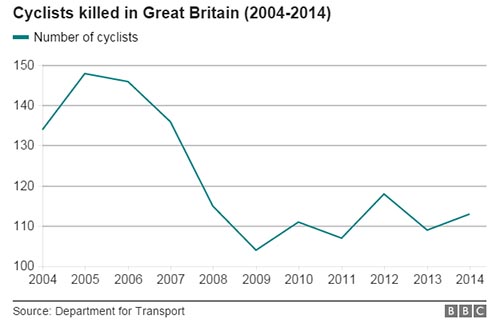By Anna Tatton-Brown & Louis Lee Ray;-
The way cycling deaths in the UK are treated by police and prosecutors may need to change, the former Director of Public Prosecutions has said. Sir Keir Starmer said there was a "very strong case" for the Crown Prosecution Service to make the final decision on whether to prosecute cases. Currently, police forces in England and Wales decide whether to pass a case on to the CPS after investigating a death. The CPS said cases should be referred to a prosecutor as early as possible.
Department of Transport figures show 113 cyclists were killed in the UK last year. Last year a Freedom of Information request by BBC's Newsbeat found that between 2007 and 2014 there were 276 recorded incidents where a cyclist was killed in an accident involving a motor vehicle. Of these, 148 - 54% - resulted in the driver of the vehicle being charged with an offence. Of those found guilty, fewer than half went to prison.
Sir Keir, now a Labour MP, told the BBC's Victoria Derbyshire programme that if a death was involved and it was serious enough to have had a criminal investigation "then it really ought to go off to the CPS for the final decision". In Scotland, if evidence suggests the driver is to blame for a collision that leads to a cyclist's death, a report is to be submitted to the Procurator Fiscal. But data compiled from a 2014 freedom of information request to Police Scotland suggests this happened in only a small number of cases.
Liability change
Cycling campaigners are calling for a change in liability - who is considered responsible for a collision - in civil cases. At the moment there is no presumption on either side.
This is Anna's story (Anna Tatton-Brown)
Last year, my dad Mick was killed as he cycled through central London. After three weeks in a coma, he died.
At the inquest the driver said the first she realised was when she heard a noise, like something falling from the sky. The coroner returned a verdict of accidental death.
We had questions about how the police were investigating from very early on. Potential witnesses weren't chased as we would have liked and we felt they just didn't think about what we were going through.
A year on from my dad's death we held a vigil at the spot where his crash happened. That day, the police told a journalist they would pass the case to prosecutors - which could lead to a trial. It felt like progress. But this changed just four days later when police again went straight to the journalist, saying the case was actually closed.
I still want to know more about what happened on the night of my dad's crash and the only option for my family is a private prosecution. The Met Police said they followed all available lines of enquiry in this case.
Rhia Favero, from the cycling charity CTC, said it supported the argument of "presumed liability" - placing the onus on the driver to demonstrate they were only partially liable for an accident. "Currently it's often on the victim to prove liability - which seems very unfair, " she said.
Sir Keir said the debate over liability had been going on for some time. "You have to be very careful with this - and I certainly wouldn't want to go to strict liability where it's automatically thought one party is at fault - but we may need to start looking again at that balance," he said.

|
How safe is cycling?
A senior lawyer who has dealt with a number of cases involving cyclists said he thought it was problematic that some senior police officers have said they would not commute on a bike in the capital.
Martin Porter QC said: "They're looking at cycling as a dangerous activity. Their emphasis then, and the emphasis of some coroners, is upon whether a cyclist is wearing a crash helmet or high visibility equipment, rather than on whether the people driving in the vicinity of vulnerable road users like cyclists are taking the appropriate amount of care not to collide with them."
Suzette Davenport, roads policing lead for National Police Chiefs' Council, said: "I wouldn't do that, because it's too busy, there are too many risks. "One of the things as a police officer, but also in my roads policing role, is my sense of risk is so heightened because of what we deal with on a day-to-day basis. We know there are a range of people who don't go home at the end of the day."
The head of the Metropolitan Police, Sir Bernard Hogan-Howe, has also previously said he would not cycle in London. A CPS spokeswoman said the police could make the decision to take no further action.
She added: "Guidelines on early investigative advice state that specific cases, including those involving a death, should always be referred to an Area Prosecutor as early as possible."
-----
The Victoria Derbyshire programme is broadcast on weekdays between 09:15 and 11:00 on BBC Two and the BBC News channel.
Reference;
http://www.bbc.com/news/uk-34604622